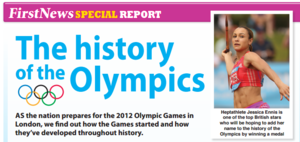


Some succeed because they are destined to but most succeed because they are determined to.
- Henry Van Dyke
Powerpoint about the Olympic Games
http://www.seomraranga.com/2014/08/the-olympic-games/ Added: 06 Jul 2016 Contributor: Denise Fitzgerald Resource type:This Powerpoint resource looks at the history of the Olympic Games from the first Olympics in Greece to the modern games. It explains about the Olympic Flag and the Olympic Flame and gives a sample list of sports included in the modern games.
View full descriptionHow it maps to the curriculum
- 3-4
- SESE History
Strand: Continuity & Change Over Time
Suggestions for use: Print out the Powerpoint slides and place around the room. Set groups into teams. You will ask a question about the Olympics and the answer will be on one of the slides printed on the wall. When you ask the question, students can discuss the answer first. Then, only one person from each group can leave the table to find the answer. They must not call out the answer back to table, it must be secretive or else point will not be rewarded for correct answer. The student who left the group to look for the answer will only be given a certain amount of time to look for answer. If they are not back in their original seat before time up, the point cannot be rewarded for answer. Groups write down their answers onto sheet.























